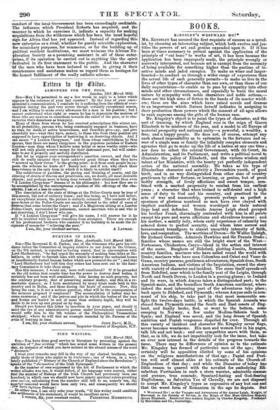fetus to tbr ititur. ALMONERS FOR THE POOR.
London, 12th March 1855.
SIR—May I be permitted to say a few words in reply to a letter which appears in the columns of your last number ? By the tone of your corre- spondent's communication, I conclude be is suffering from the effects of over- exertion during the past very severe though certainly exceptional season,
-and I am willing to make every allowance for a man in his position ; but I cannot understand what right or reason he has to depreciate the motives of those who are anxious to contribute towards the relief of the poor, or to cha- racterize their donations as trumpery. Many of those from whom he has received subscriptions this winter are, in all probability, persons who, being continually engaged in business, have no time for deeds of active benevolence, and therefore give—ay, and give cheerfully too—what they have, money, to thaw who from their position are supposed to have opportunities of bestowing it on deserving objects. And I can assure "A London Clergyman," and those whose contributions he thus spurns, that there are many clergymen in the populous parishes of Eastern - London—men than whom I believe none better or more worthy exist—who will not only gladly receive money for their distressed poor, but will under- take to see it properly and usefully distributed. But let us suppose your correspondent's assertion correct, and that the rich do really imagine they have achieved great things when they have "screwed up their virtue" to the giving point : is it from such people he ex- pects the reforms he hints at Surely not : and if not, why check their benevolence in the only form in which it is likely to exhibit itself? The subdivision of parishes, the paving and draining of courts, and the clearing of streets of thieves and prostitutes, are, no doubt, all most desirable objects; and perhaps more is being done towards their attainment than even "A London Clergyman" dreams of in his philosophy : but how they are to be -accomplished by the contemptuous rejection of the offerings of the cha-
-xitabde, I am at a baa to conceive.
The description of the state of things at the Police-Courts may be true of this season, but not of ordinary times ; and this being, as I have said before, . an exceptional season, the picture is unfairly coloured. The contents of the poor-boxes at the Police-Courts are usually devoted to the relief of eases of -diSteess that come before the Court ; and if a Magistrate sitting at a London .Police-Court, surrounded by policemen, cannot ascertain who is and who is .netdeserving, I don't know who can. If "A London Clergyman" will give his name, I will answer for it he will be troubled with no more donations from strangers. There are enough of his professional brethren who consider it no hardship to be made the re- ' cipients of means for "relieving the poor."
I am, Sir, your obedient servant, A LAYMAN.


























 Previous page
Previous page